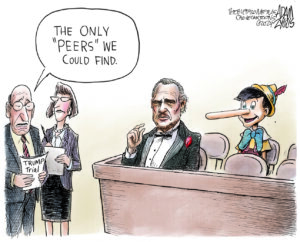From #MeToo to #WeToo
Sexual harassment of women by men is an act of retaliation, but now the foundation of patriarchal dominance may be crumbling. Sen. Kamala Harris of California is seen as a possible candidate for the Democratic nomination in the 2020 presidential election. (Damian Dovarganes / AP)
Sen. Kamala Harris of California is seen as a possible candidate for the Democratic nomination in the 2020 presidential election. (Damian Dovarganes / AP)
2017 ended with an unprecedented moment in American social history: a bonfire of allegations, denials, resignations, firings and a widespread political melee over men involved in sexual misconduct in every sort of American workplace. But few commentators have sought to explain what moves men to commit such egregious acts— other than the forcible assertion of power.
The unaddressed question remains: Why do men fear that their hold on power is in such jeopardy?
In the cases of three prominent alleged abusers—President Trump, Al Franken and Roy Moore—ludicrous justifications for their behavior have been offered. The reasons range from celebrity to comedic license to the victims’ mothers’ permission for courtship and the fact that the alleged events occurred 40 years ago. What the offenders, along with most of the journalists who report on them, have failed to realize is that sexual harassment of a female by a male is an act of retaliation.
American men, even those from backwater bayous, cannot have been oblivious to the gains made by women in business, politics and social mores.
Hillary Rodham Clinton was not merely “unlikeable.” She was the target of a festering nostalgic misogyny. Her emergence contrasted with the rise of world leaders Margaret Thatcher, Indira Gandhi, Golda Meir and Corazon Aquino because those women rose to power outside the United States. Should Elizabeth Warren or Kirsten Gillibrand or Kamala Harris come to prominence in 2020, they will be unlikeable too. It will be ballyhooed that Warren is too far to the left, Gillibrand is too singularly focused on women’s issues, and in the case of Harris, we can’t have a black person on the ticket so soon after Obama. Their “harshness” and the “unattractiveness” of their stated convictions will be cited as personal flaws.
Perhaps sexual harassment, then, becomes a way for men to register unconsciously—and quite ironically—a kind of panic over the threat to their primacy by physically assaulting what they find aggressively “unlikeable.”
And what really sends men into fits of rage is when women try to have it both ways. One can only imagine Hollywood mogul Harvey Weinstein’s rationale. Maybe his motives ran something like this: “Any woman who tries to make it in Hollywood knows exactly what commodity she’s selling. When she enters the gates of a studio, she understands that she is the product. In this town, we trade in female sexuality. That’s what Hollywood is all about. She’s fair game.”
Nor can women be comforted by the ancient biblical mandate for males to enlist them in the propagation of the race. There is an abundance of Christian males, not just in the Midwest and South, who believe God created woman—curvaceous, soft and passive—to predispose men to be fruitful, multiply and replenish the earth. So who do women think they are, male reasoning goes, to want to perpetuate the Eros archetype and also run the world?
Here, Donald Trump clearly contributes to such delusional thinking. During the campaign his remarks about rival Carly Fiorina’s face, a beauty contest winner’s penchant for gaining weight and his groping of women with impunity were salvos to turn back the clock on feminism and the sexual revolution—movements whose blueprints had long since freed women from the shackles of subjugation by males.
Marie Griffith, the John C. Danforth distinguished professor in the humanities at Washington University, states in “Christians, Sex and Politics: An American History” that widespread male opposition to the ratification of women’s suffrage in 1920 was grounded in classic patriarchal anxiety: Women would shirk their domestic obligations, and their devout attention to husbands, families and household toil would become secondary priorities. In addition, concerns arose that the new independence conferred by the right to vote might encourage promiscuity and even lead to atheism.
After suffrage became the 19th Amendment, depression, war and burgeoning post-war prosperity, to a degree, rendered women’s advances dormant for three decades. The mid-1940s in particular, with the return of World War II soldiers displacing women from the workforce, saw a significant step backward. Some women profited materially from the breadwinning of husbands, but the gains came at the cost of their economic freedom. Many unmarried females simply lost their livelihoods.
The voices of feminist icons Betty Friedan, Gloria Steinem, Kate Millett and others were welcome relief in the feminism-starved 1960s. Still, they had to compete for airtime with the clamor of the period’s noisier revolutions. Their messages and those of feminists who followed them, however, would ultimately reach millions, and as the 21st century moves forward, businesswomen like Fiorina, Meg Whitman and Ellen J. Kullman and a groundswell of women in politics are rising to an imposing stature.
There is a frightful anger in men’s unwanted physical overtures toward women, a lashing out from the steady loss of patriarchal prerogatives. The relentless empowerment of women (which will accelerate in the coming years) is knocking men off perches they have occupied since the beginnings of human history. Gender identity has been blurred by incremental waves of androgyny, apparent when the early boomers were in their 20s and progressing since then. Body piercings, purple hair, open homosexuality, ambivalence about military undertakings and uncertainty about the need to earn a living have all eroded what was once called “manliness.” As phobias rise with regard to the feminization of men, they simultaneously go ballistic over the “masculinization” of women, both undeniable factors in the Trump phenomenon.
We have entered a new era for male-female relations. The foundation of patriarchal dominance may be crumbling beneath us.
Now, there will be a steep cost to male retaliation against women.
Your support matters…Independent journalism is under threat and overshadowed by heavily funded mainstream media.
You can help level the playing field. Become a member.
Your tax-deductible contribution keeps us digging beneath the headlines to give you thought-provoking, investigative reporting and analysis that unearths what's really happening- without compromise.
Give today to support our courageous, independent journalists.






You need to be a supporter to comment.
There are currently no responses to this article.
Be the first to respond.